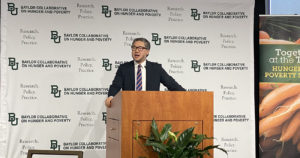WACO—Jesus’ feeding of the multitude offers a lesson in love, Bread for the World President Eugene Cho told participants at the Together at the Table Hunger and Poverty Summit at Baylor University.

“Food is love,” said Cho, formerly pastor of the multicultural Quest Church in Seattle.
To illustrate the point, Cho talked about how his parents did and did not express love when he was a child.
“Growing up, I never heard the words, ‘I love you,’” he said. In fact, he was 38 years old before his father verbally expressed love for him. At some points in his life, Cho acknowledged, he questioned whether his parents really loved him.
However, when he learned more about his parents’ early years, he gained a different perspective.
“I found out about the suffering and the abject hunger they experienced” as children in what is now North Korea.
Cho never heard the words, “I love you.” But even today when he talks to his parents, they always ask a question he often heard growing up: “Have you eaten?”
“There is no greater expression of love,” he said. “To eat means life. To eat means wellness. To eat means flourishing. … We have to ask the question of our neighbors.”
Cho offered five reflections on love and human need:
- “Love sees the whole person.”
When Jesus saw the multitudes, he recognized their spiritual hunger, but he also recognized their physical needs and met them. Any theology that focuses exclusively on the spiritual dimension without acknowledging the physical body and its needs is “a false gospel,” Cho said.
Sign up for our weekly edition and get all our headlines in your inbox on Thursdays
“We have to be about the whole gospel and the flourishing of the whole person,” he said.
- “Love makes room at the table.”
The Gospel writers spoke of Jesus feeding the 5,000, but that number included only the men—not the women and children who were present. But Jesus fed them all, and he did it after accepting the humble gift of a young boy, according to the account in John’s Gospel.
“God sees everyone and desires to make room for them at the table,” Cho said. Throughout his ministry, Jesus saw people others ignored or rejected—women, children, lepers, the marginalized and the oppressed.
- “Love pursues dignity.”
In biblical times, most people carried a pouch inside their clothing with a small quantity of food in it, Cho noted. But while others focused on scarcity and preserving what little they had, one poor boy was willing to share the little he had with Jesus, who honored the boy’s humble gift.
In effect, Cho said, the boy told Jesus, “My supper is your supper.”
- “Love builds relationships.”
Jesus saw the hungry multitude as individuals with needs, rather than viewing the feeding of them as a project to be accomplished. Likewise, Christians today should build loving relationships with people in their communities, not just see community action as a project to be completed.
“America needs a revival in the art of neighboring,” Cho said.
- “Love speaks up.”
When Jesus saw the crowds, he voiced concern about their physical needs.
Christ’s followers today have a responsibility to recognize needs around them and make their voices heard.
“Love advocates,” Cho said. “Love leads with empathy. Love acknowledges wrongdoing and inequity.”
At the most basic level, he said, love shows concern by asking a hungry person a simple question: “Have you eaten?”
















We seek to connect God’s story and God’s people around the world. To learn more about God’s story, click here.
Send comments and feedback to Eric Black, our editor. For comments to be published, please specify “letter to the editor.” Maximum length for publication is 300 words.